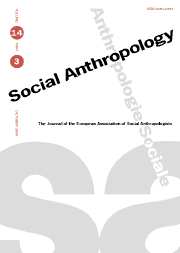Article contents
Culture and citizenship in Europe. Questions for anthropologists
Published online by Cambridge University Press: 13 December 2004
Abstract
Culture and citizenship have frequently been regarded as concepts for separate disciplines and the anthropological focus on culture has distracted attention from the concept of citizenship. Although sociologists have traditionally neglected the cultural dimension of citizenship, I argue that citizenship is an inherently cultural concept, which projects it firmly into the realm of anthropology. Whether the relationship between citizenship and culture is explicit as in the Baltic States, or denied as in the case of France, I argue that the concept of ‘culture-blind’ citizenship is impossible and that anthropologists can have a significant input into the understanding of contemporary citizenship.
La culture et la citoyenneté ont souvent été considérées comme des concepts pour des disciplines distinctes, et l'intérêt anthropologique pour la culture a détourné l'attention du concept de citoyenneté. Bien que les sociologues aient traditionnellement négligé la dimension culturelle de la citoyenneté, je soutiens que la citoyenneté est fondamentalement un concept culturel, ce qui la propulse de façon indéniable dans le domaine de l'anthropologie. Que la relation entre citoyenneté et culture soit explicite comme dans les Pays Baltes, ou niée comme en France, je soutiens que le concept d'une citoyenneté aveugle à la culture est impossible et que les anthropologues peuvent apporter une contribution significative à la compréhension de la citoyenneté contemporaine.
Kultur und Staatsbürgerschaft wurden oft als Konzepte verschiedener Disziplinen gesehen. Der ethnologische Fokus auf Kultur hat von dem Konzept der Staatsbürgerschaft abgelenkt. Obwohl Soziologen traditionell die kulturelle Dimension von Staatsbürgerschaft vernachlässigt haben, argumentier ich, dass Staatsbürgerschaft ein inhärent kulturelles Konzept ist, das deutlich in der Bereich der Ethnologie gehört. Ob die Beziehung zwischen Staatsbürgerschaft und Kultur nun explizit gemacht wird wie in den Baltischen Staaten, oder abgewiesen wird wie im Falle Frankreichs, ich zeige auf, dass ein kulturell blindes Konzept von Staatsbürgerschaft unmöglich ist. Ethnologen können eine bedeutende Rolle für das Verstehen heutiger Staatsbürgeschaft spielen.
Cultura y ciudadanía han sido frecuentemente vistos como conceptos por distintas disciplinas y el foco antropológico en la cultura ha distraído la atención del concepto de ciudadanía. Aunque sociólogos han tradicionalmente descuidado las dimensiones culturales de la ciudadanía, argumento que ciudadanía es un concepto inherentemente cultural, que se proyecta firmemente en el dominio de la antropología. Ya sea que la relación entre ciudadanía y cultura es explícita como en el caso de los Estados Bálticos, o negada como en el caso de Francia, argumento que el concepto de ciudadanía ciego a la cultura es imposible y que los antropólogos pueden tener una contribución significativa en la comprensión de la ciudadanía contemporánea.
- Type
- Research Article
- Information
- Copyright
- © Cambridge University Press 2004
- 12
- Cited by




